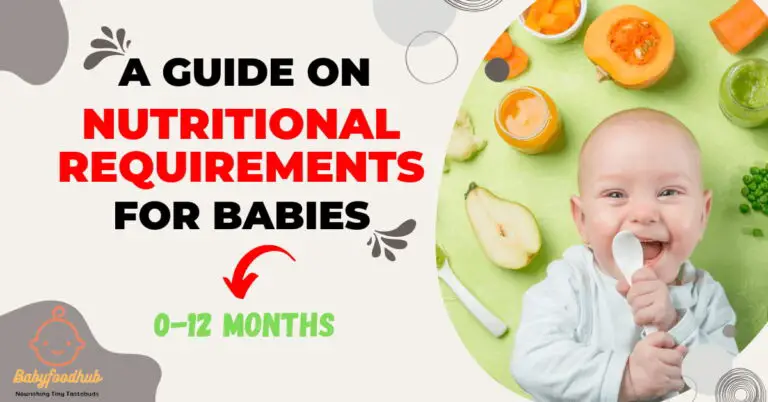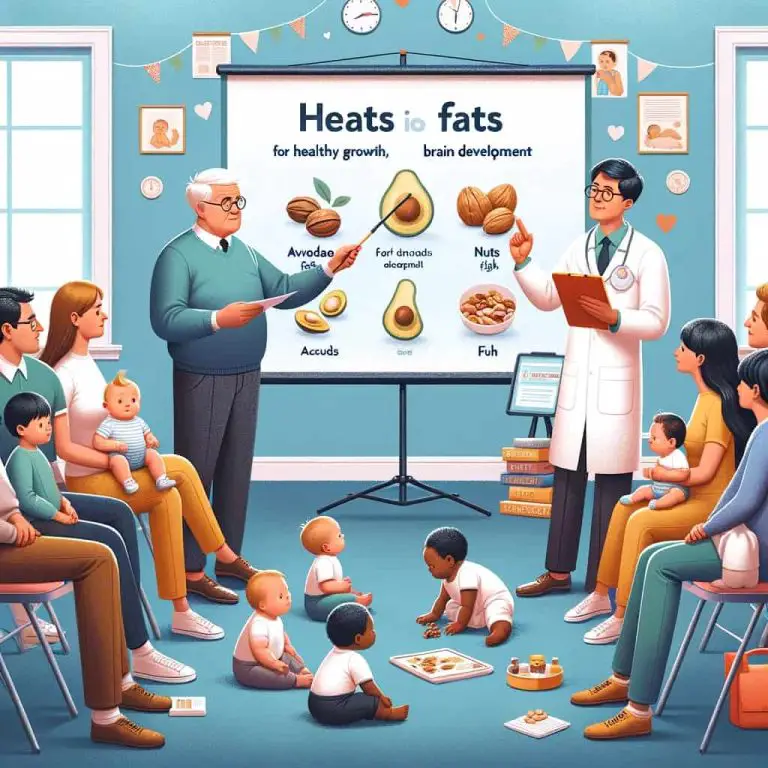Which Vitamin is Best for Babies? Essential Nutrients Guide
Vitamin D is essential for babies to support healthy bone development and immune function. This fat-soluble vitamin helps with calcium absorption, crucial for skeletal growth.
When we think about keeping babies healthy and helping them grow, vitamins play a superhero role in their lives. Imagine vitamins as tiny helpers that work day and night to make sure babies grow up strong, healthy, and happy. Just like we need different tools to build something amazing, babies need different types of vitamins to build their strong bodies and smart brains.
Vitamins are special nutrients that our bodies need but can’t make all by themselves. That’s why babies need to get them from their food. Each vitamin has a special job. For example, Vitamin A is like a superhero for eyesight, helping babies see the world. Vitamin D is like a strong friend for bones, making them strong and healthy. Vitamin C is like a shield, protecting the body from getting sick. In this article, we will read about which vitamins are most important for babies.
Essential Vitamins For Infants
Essential vitamins for infants are crucial for their growth and development. From the moment a baby is born, they rely on a delicate balance of nutrients to build their immune system, strengthen bones, and ensure the proper function of their organs. Let’s dive into these vitamins one by one.
Vitamin A supports eye health and immune function. It also plays a key role in heart, lung, and kidney development. Foods rich in Vitamin A include:
- Sweet potatoes
- Carrots
- Spinach
Vitamin B complex contributes to energy levels and cognitive development. Here’s a quick snapshot of key B vitamins:
| Vitamin | Benefits |
| B2 (Riboflavin) | Helps energy production |
| B3 (Niacin) | Supports skin health |
| B6 (Pyridoxine) | Crucial for brain development |
| B12 (Cobalamin) | Essential for nerve function |
Vitamin C boosts the immune system and helps in iron absorption. It’s found in:
- Citrus fruits
- Strawberries
- Tomatoes
Vitamin D is essential for bone growth and calcium absorption. Natural sources include:
- Sunlight
- Fish
- Eggs
Vitamin E acts as an antioxidant and supports the immune system. It’s found in:
- Nuts
- Spinach
- Whole grains
Vitamin K is necessary for blood clotting and bone health. Infants often receive a Vitamin K shot at birth due to its importance. Dietary sources include:
- Green leafy vegetables
- Dairy products
- Meat
Vitamin Types
Choosing the right vitamins for your baby ensures a healthy start. Vitamins are vital for growth and development. They come in two main types: fat-soluble and water-soluble. Both types are crucial for your little one. Let’s explore each in detail.
Fat-soluble Vitamins
Vitamins A, D, E, and K fall into the fat-soluble category. They are stored in body fat. A proper balance supports vision, bone health, and blood clotting.
- Vitamin A helps with eye health and immune function.
- Vitamin D is crucial for bone growth and immune support.
- Vitamin E protects cells from damage.
- Vitamin K assists in healthy blood clotting.
Water-soluble Vitamins
Water-soluble vitamins include Vitamin C and the B-vitamin complex. Unlike fat-soluble vitamins, these are not stored in the body. Regular intake is essential.
| Vitamin | Benefits |
| Vitamin C | Boosts immunity, heals wounds and aids in iron absorption. |
| B-Vitamins | Support metabolism, energy, and brain development. |
Recommended Daily Intake Of Vitamins For Babies
Understanding the recommended daily intake of vitamins for babies is crucial for their development. Babies need vitamins for growth, vision, and a strong immune system. Unlike adults, babies have specific nutritional needs. It’s important to provide the right balance to support their rapid development. Parents need to be aware of how much is just enough.
Age-specific Vitamin Recommendations
As babies grow, their nutritional needs change. The table below breaks down the key vitamins and recommended dosages for different age groups.
| Age | Vitamin A | Vitamin C | Vitamin D | B Vitamins |
| 0-6 months | 400 mcg | 40 mg | 10 mcg | Varies by specific type |
| 7-12 months | 500 mcg | 50 mg | 10 mcg | Varies by specific type |
Consult a pediatrician to get precise amounts for each vitamin. Remember, these are general guidelines.
Possible Risks Of Excess Vitamin Intake
Giving babies more vitamins than recommended can lead to health issues. Symptoms of vitamin overdose include nausea, diarrhea, and constipation. In severe cases, it can lead to organ damage. Always follow the pediatrician’s advice on vitamin supplementation.
- Vitamin A: Too much can cause liver damage and skin issues.
- Vitamin C: High doses can lead to kidney stones and gastrointestinal upset.
- Vitamin D: Excess can cause calcium buildup, affecting the heart and kidneys.
- B Vitamins: While rare, an overdose can cause nerve and digestion problems.
Keep vitamins away from children when not in use. Only use supplements made specifically for babies, and never exceed the recommended dose unless directed by a healthcare professional.
Vitamin A
Vitamin A is crucial for babies. It helps them grow strong and healthy. Babies need the right vitamins to see well and fight off germs. Vitamin A is a top choice for your baby’s health. Let’s learn why it’s so important.
Role Of Vitamin A In Baby’s Growth And Development
Vitamin A supports many parts of a baby’s body. It is vital for good vision. It helps skin and organs grow. Vitamin A boosts the immune system too. Without enough Vitamin A, babies may not grow as they should.
Natural Sources Of Vitamin A
Babies can get Vitamin A from food. Here are some natural sources:
- Carrots
- Sweet potatoes
- Spinach
- Dairy products like cheese and yogurt
Breast milk also has Vitamin A. This is perfect for babies.
Potential Side Effects Of Vitamin A Deficiency
A lack of Vitamin A can cause problems. Here’s what might happen:
| Deficiency Effect | Description |
| Poor Vision | Babies may have trouble seeing, especially in the dark. |
| Weak Immunity | They may get sick more often because their body can’t fight germs well. |
| Slow Growth | Babies may not grow as expected if they don’t get enough Vitamin A. |
Credit: www.medicalnewstoday.com
Vitamin D
Vitamin D is a sunshine nutrient babies need from their early days. It helps their bones grow strong. Without it, they might face health troubles. Let’s dive into why vitamin D is a superhero for your little one’s development.
Importance Of Vitamin D For Baby’s Bone Development
Vitamin D is crucial for babies. It works like a magic key that helps the body use calcium from foods. This process is vital as calcium is the building block for strong bones and teeth. A baby’s bones are growing every day. Vitamin D ensures this growth is healthy.
Ways To Ensure Adequate Vitamin D Intake
- Give your baby brief sun exposure. Just a little sunlight can do wonders.
- Choose vitamin D supplements if your doctor recommends them.
- Feed your baby vitamin D-fortified formula or foods when they start solids.
- Breastfeeding moms can take supplements to pass vitamin D through milk.
Symptoms And Consequences Of Vitamin D Deficiency
Low vitamin D levels bring trouble. Your baby might show signs like weakness or bone pain. In serious cases, they may develop rickets, a disease that makes bones soft and weak. This is why keeping an eye out for these symptoms is key:
| Symptom | Consequence |
| Weakness | Poor bone health |
| Bone pain | Issues with bone structure |
| Growth delays | Long-term development problems |
Getting enough vitamin D is easy with the right steps. Remember to talk with a healthcare provider for the best advice for your baby.
Vitamin C
As parents seek to bolster their baby’s health, Vitamin C stands out. This essential nutrient supports a young one’s growth and development. It helps form and repair red blood cells, bones, and tissues. It also helps your baby’s gums stay healthy and strengthens your baby’s blood vessels, minimizing bruising from falls and scrapes. Vitamin C improves iron absorption and plays a critical role in keeping infections at bay.
Benefits Of Vitamin C For Baby’s Immune System
Vitamin C is a superhero when it comes to your baby’s immune system. It strengthens the body’s natural defenses. Babies with robust immune systems can fight off colds and infections more effectively. A strong immune system sets the stage for lifelong health.
Food Sources Rich In Vitamin C
Natural food sources are the best way to deliver Vitamin C to your baby. Here’s a short list of Vitamin C-rich foods:
- Oranges – Juicy and sweet, perfect for older babies.
- Strawberries – These berries are not only delicious but also packed with nutrition.
- Broccoli – A versatile vegetable that’s full of vitamins.
- Tomatoes – Easy to mix with other foods for a Vitamin C boost.
- Bell peppers – Colorful and flavorful, great for adding to various dishes.
Signs Of Vitamin C Deficiency
Even with a proper diet, sometimes babies might not get enough Vitamin C. Look out for these signs:
| Signs of Deficiency | Description |
| Irritability | Babies seem unusually fussy or cranky. |
| Delayed Healing | Small wounds take longer to heal. |
| Gum Swelling | Gums appear swollen or unhealthy. |
| Anemia | Lack of energy or pale appearance might indicate anemia caused by Vitamin C deficiency. |
If you observe any of these signs, consult your pediatrician. A balanced diet and proper nutrition will help your baby thrive.
Vitamin B12
When it comes to nurturing the health of an infant, vitamin B12 plays a pivotal role. This essential nutrient helps in the proper development of the baby’s brain and nervous system. Understanding the importance of vitamin B12 can help ensure that babies get a strong developmental start.
Role Of Vitamin B12 In Baby’s Brain Development
Vitamin B12 is crucial for a baby’s growing brain. It works to support the formation of healthy red blood cells. These cells carry oxygen to the brain. B12 also maintains the health of nerve cells. Healthy nerve cells help create a robust communication network in the brain.
Animal-derived And Plant-based Sources Of Vitamin B12
For babies, the primary source of vitamin B12 is breast milk or formula. Animal sources like meats, dairy, and eggs offer vitamin B12 in high amounts. Yet, some parents raise their children on plant-based diets. These diets may need fortified foods or supplements.
- Beef, chicken, fish
- Milk, cheese, yogurt
- Fortified cereals and non-dairy milks
Effects Of Vitamin B12 Deficiency
A deficiency in vitamin B12 can be serious. Lack of B12 might lead to anemia and neurological issues. Infants may show signs of weakness and slow development. Prompt detection and treatment are key to preventing long-term damage.
| Signs of Deficiency |
| Developmental delays |
| Weakness, fatigue |
| Irritability |
Multivitamin Supplements For Babies
Parents often wonder about the nourishment their babies receive. As little ones grow, they need a variety of nutrients to support their rapid development. While breast milk or formula provides much of the essential nutrition, certain situations may call for additional support. Multivitamin supplements for babies can play a crucial role in ensuring they do not miss out on vital vitamins and minerals.
When And Why Multivitamin Supplements May Be Recommended
Babies might need a supplement boost when their dietary intake lacks adequate nutrients. This is often the case with premature infants, babies with certain health conditions, or those with restricted diets (like vegan). Pediatricians may advise multivitamins to ensure these little ones stay on track with their growth and developmental milestones.
Choosing The Right Type Of Multivitamins
- Look for age-specific formulas tailored to the nutritional needs of babies.
- Consult a pediatrician before selecting a multivitamin to ensure suitability.
- Opt for multivitamins with critical vitamins and minerals such as Vitamin D, iron, and calcium.
- Choose products from reputable brands with certified manufacturing practices.
Safety Considerations And Precautions
- Always follow dosage instructions to avoid any potential harm.
- Store supplements out of reach of children to prevent accidental ingestion.
- Be aware of potential allergies or adverse reactions; report any unusual symptoms to a healthcare provider immediately.
Regular check-ups can help ensure that your baby is meeting their nutritional needs, with or without a supplement.
Consulting A Pediatrician
When ensuring the health of your little one, consulting a pediatrician is a critical step. Babies have unique nutritional needs. A pediatrician can guide you in choosing the right vitamins.
Importance Of Professional Medical Advice
Advice from a pediatrician is vital. Experts understand babies grow at different rates. They rely on their knowledge to recommend the best vitamins for your baby’s development.
Discussing Vitamin Options With The Pediatrician
Having a conversation with your pediatrician opens the door to custom recommendations. They address concerns like dietary restrictions or allergies. Pediatricians consider your baby’s health history. This ensures the optimal vitamin choice.
Monitoring Baby’s Vitamin Levels
Regular check-ups with your pediatrician help to track vitamin levels. They can conduct tests if needed. The results show if your baby gets enough vitamins from diet or requires supplements. This check keeps your baby’s growth on track.
Remember, a balanced diet usually provides the necessary nutrients. Supplements are for babies with specific needs. Always opt for pediatrician-recommended vitamins. This ensures your baby’s well-being.
Frequently Asked Questions For Which Vitamin Is Best For Babies?
Which Multivitamin Is Best For Baby?
The best multivitamin for a baby depends on specific needs and pediatrician recommendations. Choose well-reviewed brands formulated for age-related dietary requirements.
Is It Better For Mom Or Baby To Take Vitamin D?
Both mom and baby need vitamin D, but mothers should take supplements to ensure adequate levels in breast milk for the baby.
When Should I Give My Baby A Vitamins?
Consult with your pediatrician about vitamins for your baby. They may suggest supplements if your child has a specific nutritional need or dietary restriction. Generally, breastfed infants might benefit from vitamin D drops.
What Is The Best Vitamins For Brain Development For Baby?
The best vitamins for brain development in babies include DHA, choline, folate, and vitamins A, C, D, and E. Always consult a pediatrician before supplementation.
Conclusion
Navigating the best vitamin for your baby can be simple. Prioritize Vitamins A, C, D, and essential B vitamins. For optimal growth, a balanced diet supplemented with pediatrician-recommended vitamins is key. Always consult with a healthcare provider to tailor to your infant’s unique needs.
Remember, the right vitamins support a thriving start to life.







